Battling the ‘hunger virus’ by Leader of the House Senator Dr Shahzad Waeem
The deadly and disruptive Covid-19 pandemic has brought to the fore the fragility of human life as well the fissures and weaknesses in the global economic, trade and healthcare systems, social…
Share
Next Story >>>
The deadly and disruptive Covid-19 pandemic has brought to the fore the fragility of human life as well the fissures and weaknesses in the global economic, trade and healthcare systems, social fabric and disaster response mechanisms.
The pandemic also spawned socio-economic ramifications as the ‘hunger virus’. A significant proportion of the world’s population living close, on or below the poverty line struggled even to get food, let alone other necessities. This view is also supported by a July 9 Oxfam publication, ‘The hunger virus: how Covid-19 is fuelling hunger in a hungry world’, which says that Covid-19 is deepening the hunger crisis in the world’s hunger hotspots and creating new epicenters of hunger across the globe.
The complete lockdown policy, as we have also seen in India and other parts of the world, did not turn out to be socio-economically viable or sustainable. The New York Times, in an article, outlined the failure of Prime Minister Narendra Modi’s government in dealing with the Covid-19 pandemic. Also Tim Sebastian, in one of his ‘Conflict Zone’ segments on DW TV, severely berated the Indian government for the hasty and ill-planned March 24 lockdown that left millions of workers in cities stranded without jobs, shelter, food and means of transport.
However, Pakistan, as per Prime Minister Imran Khan’s vision, quite early on realized that a complete lockdown was not a sustainable and viable solution. Therefore, the PTI government, keeping in view the economic challenges as well as hardships being faced by the common citizen, prioritised providing relief to the common man, labourers, daily-wage earners, poor people, traders and the business community. In this regard, the policy of ‘smart lockdown’ was strategically implemented, based on real time data and targeting only those localities where a higher incidence of the disease was observed or reported. A ‘testing, tracing and quarantining’ (TTQ) strategy is being employed as part of the containment strategy.
The ‘smart lockdown’ was not an easy decision, and proved to be a test of strong leadership and nerves amidst scathing criticism from different quarters. However, as the world also acknowledged later on, it proved to be the most effective and pro-people approach to tackle the pandemic. The Bloomberg news agency also termed the smart lockdown approach the only hope of returning to a more normal life as the world awaits a vaccine. Also, Business Standard, a Bangladesh-based news platform, while lauding Prime Minister Imran Khan’s policy of smart lockdown, stated that “But now as the results show that the measure works, many developing nations are also promoting the policy”.
Pakistan, despite meager resources and economic difficulties, efficiently handled the pandemic situation through visionary leadership, realistic and futuristic policies, self-reliance and effective coordination between federal and provincial health authorities despite ‘health’ being a devolved subject post the 18th Amendment.
When the PTI government came to power, the health sector in general, and epidemic and disease surveillance and response mechanisms in particular, were in a shambles. The incumbent government, under the leadership of Prime Minister Imran Khan, made hectic efforts to ameliorate the situation and set right the wrongs of the past. This progressive approach proved very conducive to effectively and efficiently handling the Covid-19 pandemic.
Through tailor-made strategies, the capacities of our healthcare institutions were enhanced along with our testing capabilities and number of laboratories. Indigenous capacities were built, as a result of which Pakistan is now not only manufacturing ventilators and personal protective equipment (PPE), but also exporting the same.
The National Command and Operations Centre (NCOC) proved to be a nerve centre to synergize and articulate unified national efforts against Covid-19. Taking another step in the right direction, Prime Minister Imran Khan launched the Ehsaas Emergency Cash programme in order to provide cash assistance to millions of poor people who lost their jobs due to the outbreak. The driving idea behind the economic stimulus initiative was to support small businesses and protect the livelihoods labourers and other workers.
The Covid-19 pandemic also proved to be a test of leadership around the world. In the South Asian context, Prime Minister Modi’s weak leadership and mishandling of the situation was severely exposed and widely criticized. On the other hand, Prime Minister Imran Khan’s visionary leadership, his bold pro-people policies, timely decisions and very apt handling of the situation were well appreciated worldwide.
The key takeaway based on Pakistan’s handling of the crisis is that health forms an integral part of a country’s national security matrix, and, hence, must be prioritized as such as being done by the PTI government. Strategic implementation of the ‘smart lockdown’ proved crucial to minimizing disease prevalence, human suffering and the socio-economic impact of the pandemic. However, we must not let our guard down and become complacent. Strict observance of SOPs, maintaining social distancing and adopting precautionary measures as defined by the government will see Pakistan home and dry.
As they say: “The tests we face in life’s journey are not to reveal our weaknesses but to help us discover our inner strengths. We can only know how strong we are when we strive and thrive beyond the challenges we face”.
While the Covid-19 pandemic has posed many challenges, it has also given us all an opportunity to discover and tap our hidden potentials and strengths.
